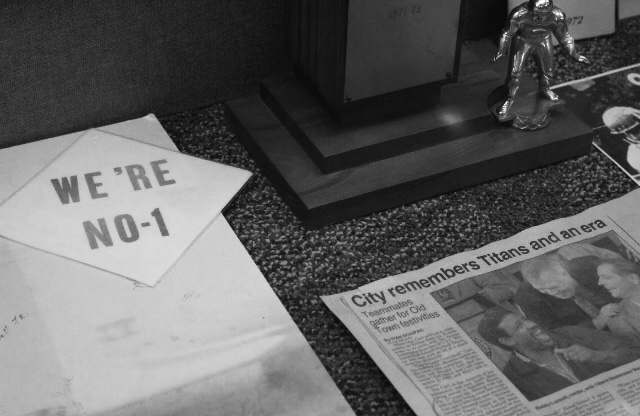Norah Ludke and Abigail Ernst
September 23, 2020, will be exactly 20 years since the movie, Remember the Titans came out. In honor of the anniversary, we asked Titan alumni, and past and current staff, to recount their experiences and stories. These stories include memories and events at T.C. at the era the movie portrayed and at the time that the movie was released.
Remember the Titans was based on the 1971 T.C. football team. Many of the people whose stories we collected had personal connections with the coaches and players, despite racial and gender barriers. The movie told the story of some, but there are many more stories to be told.
Verona Iriarte, from the Class of 1973, played volleyball and received a varsity letter as a co-captain during the time period that the movie was set. As a Puerto Rican, Black, and Native American female athlete, Iriarte’s achievement predated the Title IX amendment, making it an especially impressive accomplishment.
Title IX is a federal law that states “No person in the United States shall, on the basis of sex, be excluded from participation in, be denied the benefits of, or be subjected to discrimination under any education program or activity receiving Federal financial assistance.”
Iriarte recalls that although there was racism prevalent at T.C. in 1971, the film’s portrayal of racism was not accurate. “[The] evidence of racism was in the curriculum and in the City of Alexandria,” Iriarte said.
Desegregation in ACPS took time. The process involved federal and state legislation, violent protests, political unrest, and changes in the ACPS School Board and Alexandria City Council. Ten years after Brown vs. Board of Education, ACPS finally had a plan for desegregation in 1965.
“Looking back on the experience, I recall it as being my best high school year,” said Scott Marinoff, a 1972 graduate, about his senior year. “I had attended Bishop Ireton (BI) in ninth and tenth grades, then GW in eleventh,” he said.
Marinoff started high school in ACPS under a new consolidation plan that sent all juniors and seniors in the city to T.C., while freshmen and sophomores attended either George Washington (GW) or Francis C. Hammond high schools.
In the inaugural school year, many students felt they were playing an active role in bringing change and progress, he said.
Jeff McCarney, Class of 1973, transferred to T.C. when T.C., Hammond, and GW were merged. He had attended BI freshman and sophomore years.
“I attended Parker-Gray Middle School, so I was already used to an integrated [school],” said McCarney. The movie, however, suggests that ACPS integrated in the year the movie is set.
Polly Cox, Class of 1973, says the movie inflated the racial tension at T.C. “There were fights between all types of students.” Cox said. “The movie wants you to believe that this was the time frame of integration… that is totally false. I went to [an integrated] elementary, middle school and high school before 1971. Most of the movie is made up for [the purpose of] Hollywood.”
Alyce Horwat, from the class of 1976, remembers that she did not really notice racial issues as a kid. “My mom told me … I had a favorite teacher who taught music and I just raved about him all the time,” she said. “When she went to ‘back to school night’ and met him, she was in shock that he was black because I had never mentioned it. It was around 1969 and I think the parents were the ones with bigger issues.”
Horwat said “I did not feel a great divide as they showed”. She recalls getting along with many different people in high school.
She also says that her biggest issue with Remember the Titans was that “ it portrayed T.C. as in some sort of backwoods Virginia setting.”
“The movie may have portrayed the feelings and actions of some people in the years before my attendance,” said Horwat, “but it did not portray what my experience was like at all.”
Les Wilmer, who graduated in 1973, also believes the movie exaggerated the situation. “The football team did not ‘unite’ the city,” he said. He recalls many incidents of racial violence both at T.C. and in the city. According to Wilmer, many turned “deaf ears” to these incidents.
Leslie Jones did not attend T.C. in the 1970s, however, she was teaching when the movie came out in 2000. She recalls attending the film premiere in Alexandria with the Junior Varsity Cheer team, which she coached.
Jones says at that premiere she met Coach Herman Boone and Coach Bill Yoast, and “forged friendships with both of them.” Over the years, she became closer to Boone as they went to various T.C. games together. She later met Coach Glenn Furman. “It was such a pleasure to know all three of these men,” Jones said.



